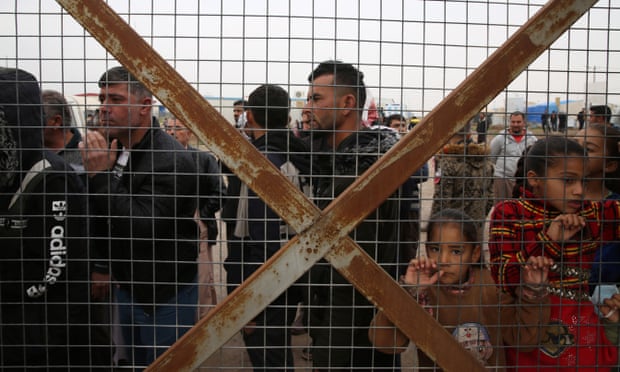Global humanitarian figures and NGOs call for rollout to take in all people for the global public good
January 3, 2021

Source: The Guardian
Global humanitarian figures and NGOs have urged world leaders to urgently make Covid-19 vaccinations available to millions of refugees and others displaced by war, as the pandemic continues to overwhelm some of the world’s most vulnerable communities.
The impact of the contagion has sharply intensified across the Middle East in recent weeks, matching soaring global numbers. However, it has been further amplified by drastically underresourced medical responses that cannot cope with the numbers of dying or seriously ill.
In northern Syria and Iraq, where millions of people remain displaced or in internment camps, images of vaccines being administered in the US and UK have heightened fears that the collective efforts of global scientists will be focused on developed societies.
The UN secretary general, António Guterres, has pleaded for the vaccines being rolled out across the globe to be made available to “all people” and that their distribution must be viewed as a “global public good”.
His comments followed mounting concerns that a scheme to deliver Covid vaccines to poorer countries faces a high risk of failure and could leave at least half the planet without vaccinations for at least the next three years.
The World Health Organization (WHO) is administering the rollout to poorer nations and said it aims to have 2 billion people vaccinated by the end of 2021. However, the target has been described by senior UN officials as ambitious and unlikely to be met without a serious upscaling of resources and political mobilisation.
The UN’s refugee body, UNHCR, and the International Organization for Migration (IOM) have added weight to the concerns, imploring that refugees and migrants are included in governments’ vaccine allocations.
“In these times of pandemic and beyond, [we] … stand ready to support governments in their efforts to make health care available for all, through universal health coverage, a reality,” said IOM director general António Vitorino.
“Access to health is a fundamental right, but too often still those who need it the most – including migrants and forcibly displaced persons – are left out. If 2020 has taught us something, it is that ill health is a universal issue that does not distinguish based on nationality; so, to be truly effective, neither should our health coverage, including in upcoming Covid-19 vaccination efforts.”
Mercy Corps, an international aid agency, said significant difficulties already existed in delivering basic necessities to places such as Yemen and Syria, where needs for a vaccine are great. “The risks and challenges ahead aren’t limited to vaccine supplies or maintaining a cold chain,” said the organisation’s chief executive, Tjada D’Oyen McKenna. “In conflict zones and places hosting refugees and internally displaced people, vaccines are likely to become yet another scarce resource that is contested – with the potential for escalating tension and conflict as a result.
“The international community must ensure through diplomatic pressure and on-the-ground support that vaccines reach all communities, including the most vulnerable and marginalised, in ways that prevent grievances and conflict.
“We also urgently need donors and governments to fund trusted community organisations to begin the outreach work now to ensure that misinformation is tackled and communities accept a vaccine when it does arrive. If we don’t act together as a global community, we risk leaving an entire generation of the most vulnerable behind.”
UNHCR said it has managed to maintain infection rates among forcibly displaced communities at comparable levels to local populations. However, official numbers of infections provided by governments in countries such as Syria are widely believed to be an extreme underestimation.
Senior members of the UN system fear that the distribution of vaccines will become a political tool, as have other forms of aid, such as food and medicine. Host governments are likely to be the primary means of entry of the vaccine.
Throughout the Syrian war, communities that have remained outside the control of the Assad regime have been routinely denied access to lifesaving essentials. Iraq’s displaced communities have had a similar experience.
“I don’t think we will get this vaccine as internally displaced people in the camps because we need a representative to source it for us,” said Mahmoud Sleiman, a resident of the Hassan Sham camp in northern Iraq. “In our case it is the government that should order for us, and I doubt they will get it in time. Even if they do, there will be corruption in the process and only rich people will get it. Poor people like me never will.”
UNHCR said global numbers of forced displacement crossed the 80 million mark in the middle of 2020. More than 50 million people were internally displaced, with potentially less access to international aid than those who had made it across international borders.
“My cousin got to Turkey and he says the Turks may get to him and his family in March,” said Ghassan Abbad, a Syrian who fled to Idlib province from government-controlled Damascus in 2016. “But here, only God can help us. There are so many dead and dying here. The curse has come to us, and nothing can lift it for many more months.”
Khalid Murad, a Yazidi member of a camp in the Kurdish north of Iraq, said time was against refugees and displaced people, who saw no real hope coming. “I don’t think this vaccine is only for the west but I think it will take a long time for Iraqi people to receive it. If Iraq receives the vaccine we will also get it, despite the fact that they don’t consider Yazidis as Iraqis. But under international pressure it will come to us eventually.”
